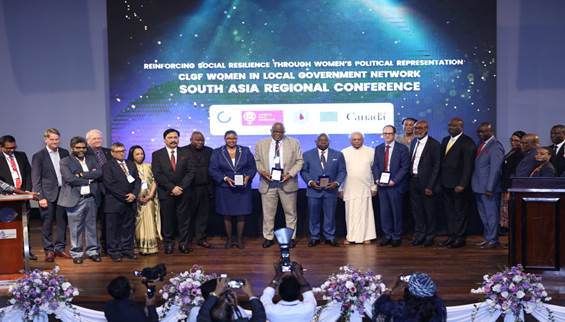Bhubaneswar: Dr. Chandra Shekhar Kumar, Additional Secretary of the Ministry of Panchayati Raj, represented India at the three-day Commonwealth Local Government Forum (CLGF) Annual Board meeting held in Colombo, Sri Lanka, from June 25-27, 2024. The conference facilitated regional exchange and priority setting for ongoing initiatives in Commonwealth Asia and guided the future work of CLGF’s Commonwealth Women in Local Government Network.
The event commenced with the inauguration of the Commonwealth Women in Local Government Network South Asia Regional Meeting on “Reinforcing Social Resilience through Women’s Political Representation” by the Prime Minister of Sri Lanka, Shri Dinesh Gunawardena, on June 25, 2024.
During his address at the CLGF conference, Dr. Chandra Shekhar Kumar proposed hosting the next CLGF meeting in India, the largest member country of the Commonwealth. He emphasized this initiative as a means to promote and strengthen democratic local governments across the Commonwealth and foster the exchange of best practices.
Dr. Kumar shared insights during a session on “International Experience: Cases from the Commonwealth – Economic and Spatial Inclusion,” highlighting the pivotal role of India’s approximately 2.6 lakh Panchayati Raj Institutions (PRIs) in covering 60% of the population and significantly contributing to the GDP. He emphasized the importance of women’s roles in development, noting that women constitute 48% of the rural population with a labor force participation rate of 41.5% in 2022-23. The 73rd Constitutional Amendment mandates the devolution of powers to Panchayats, including “Women and Child Development,” to enhance local governance.
Dr. Kumar stressed that India is a global leader in gender representation at the grassroots level, with 46% of local body positions held by women in PRIs/Rural Local Bodies, compared to the global average of 36%. He highlighted that significant representation of women in decision-making processes and women-led development is crucial for achieving the United Nations 2030 Agenda for Sustainable Development. The Government of India supports women’s empowerment through various schemes, contributing substantially towards education, health, economic empowerment, digital literacy, leadership skills, and security. The Ministry’s e-Governance initiatives have made Panchayat representatives digitally proficient, with 90% of Gram Panchayats uploading online development plans and financial transactions.
Dr. Kumar also underscored the Ministry of Panchayati Raj’s efforts in providing international exposure to Elected Women Representatives (EWRs) and adopting the Localization of SDGs (LSDGs) approach, including the “Women Friendly Panchayat” theme. He highlighted that the Ministry has provided opportunities and exposure for elected women leaders at international forums and events, such as “Localizing the SDGs: Women in Local Governance in India Lead the Way” on May 3, 2024, at the United Nations Headquarters in New York, and “Women Leaders as Change-makers: Gender Equality for Good Governance” in October 2019 at the United Nations.
Dr. Kumar mentioned that States and UTs, guided by the Ministry of Panchayati Raj, have implemented measures such as reservation for women, participation programs, and training initiatives to enhance women’s roles in local governance. Under the Ministry’s guidance, 23 States and UTs have adopted 50% reservation for women, exceeding the Constitutional provision of 33% reservation in PRIs/RLBs.
India has emerged as a global leader in gender representation at grassroots levels, with 46% representation in local bodies, surpassing the global average of 36%. Key factors for increased women’s participation in PRIs include constitutional provisions, socio-economic improvements, and government support through various women-oriented schemes. Dr. Kumar also highlighted the Ministry’s initiatives in digital empowerment and international exposure for women leaders, alongside the adoption of Localization of SDGs for women’s empowerment in local governance.
Dr. Kumar engaged with colleagues from Commonwealth Local Government organizations from around the world, exchanging insights and discussing strategies for enhancing local governance and community resilience. He reiterated India’s commitment to empowering women and strengthening rural communities. The CLGF Forum brought together a diverse group of local government participants, including Ministries of Local Government, elected local mayors and leaders, permanent secretaries, officials from all spheres of government, academics, and development partners.
Three women Sarpanch from Maharashtra – Smt. Archana Pawar (Kumbhari Gram Panchayat, Yavatmal District), Smt. Sharda Gaydhane (Bela Gram Panchayat, Bhandara District), and Smt. Kavita Ware (Kisal Gram Panchayat, Thane District) – along with Smt. Chandrika Rangani from Gujarat (Kanakpar Gram Panchayat, Kachchh District), also participated in the CLGF Conference. They presented their case studies, best practices, and success stories. Training in digital and social media was conducted for Local Self-Government delegates during the Commonwealth Women in Local Government Network South Asia Meeting. This forum provided women with an opportunity to share their experiences as grassroots leaders, discuss challenges faced by women in local government, agree on actionable points to strengthen elected women and women’s rights, and build capacity in specific focus areas for local leaders.





